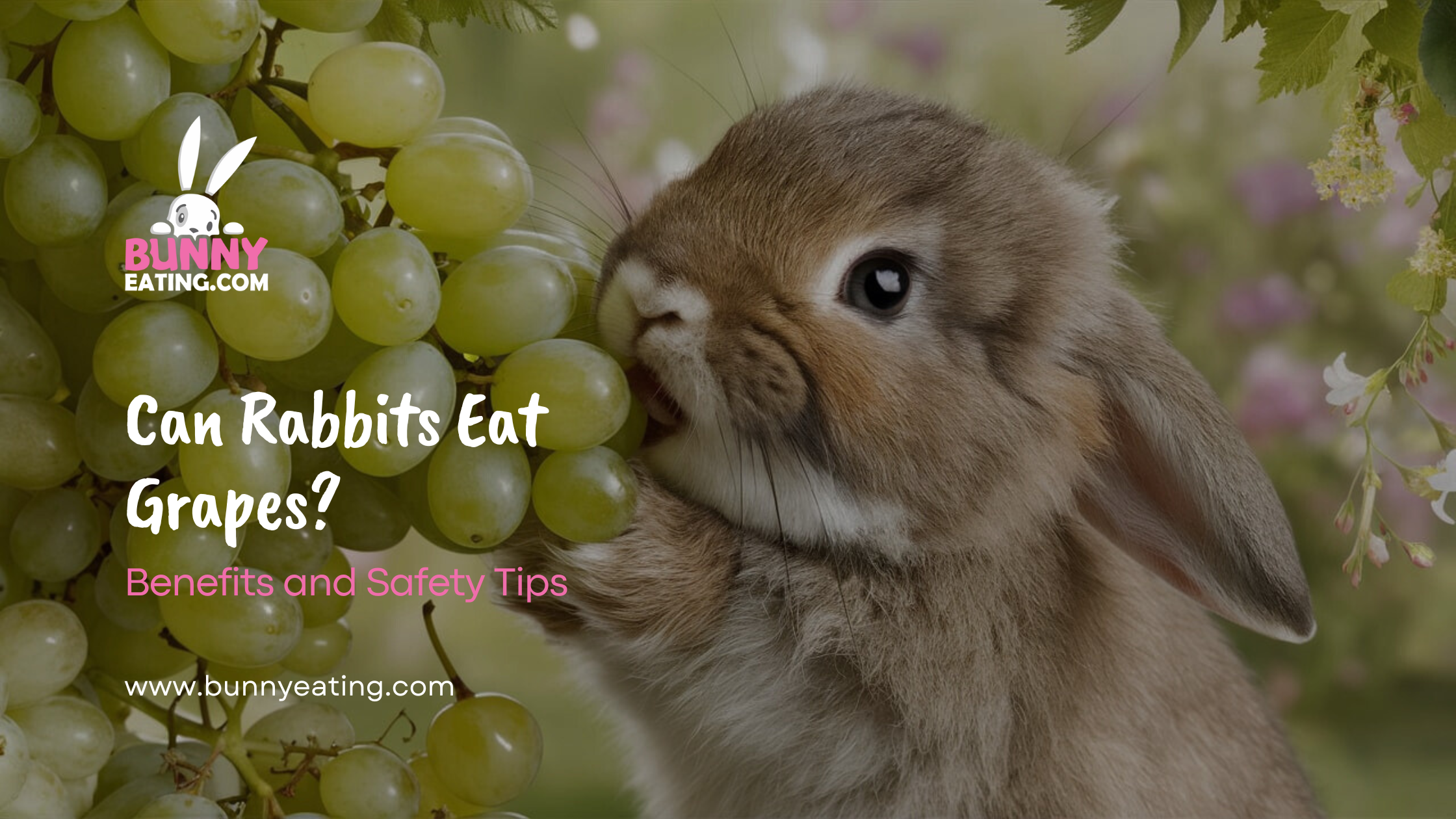Providing your rabbit with an appropriate diet to eat is very essential for their well-being. Even though rabbits seem to enjoy the taste of grapes, it has detrimental effects on their health. This article aims to give readers a better understanding of the various risks and implications of feeding grapes to rabbits. In this guide, you’re going to learn all you want to know about rabbits and grapes, safe substitutes, and tips to avoid making your rabbit ill. Click here to find out more about why grapes might not be the right thing to feed your rabbit and which treats could be safer for him. Can Rabbits Eat Grapes?
Safe Alternative to Grapes for Rabbits?
It is important to note that while rabbits can be fed fruits and vegetables occasionally, not all are safe to be included in their diet. Fruits: Grapes should be avoided for the most part because of their high sugar content even though they may be very enticing. It is safer to provide your rabbit with healthy substitutions such as apples excluding seeds, blueberries or strawberries in limited quantities. Other examples of low-carb vegetables are romaine lettuce, cilantro, and basil to name but a few. These alternatives supply the body with some of the nutrients it needs, but they are free from high levels of sugar which can cause health complications.
Risks of Feeding Grapes to Rabbits
Feeding grapes to rabbits carries several risks. Firstly, grapes are high in sugar, which can disrupt a rabbit’s digestive system. Rabbits have sensitive digestive tracts, and too much sugar can lead to obesity, dental problems, and digestive issues. Additionally, grapes can cause gastrointestinal stasis, a severe and potentially fatal condition where the rabbit’s digestive system slows down or stops. This risk is compounded if the grapes are not washed thoroughly, as pesticides and chemicals can be harmful to rabbits.
Effects of Grapes on Rabbits
The effects of grapes on rabbits can vary, but generally, the high sugar content can lead to weight gain and dental issues. Over time, this can result in obesity, which is associated with a host of health problems, including heart disease and arthritis. Furthermore, the sugar in grapes can cause an imbalance in the rabbit’s gut flora, leading to digestive issues such as gas, bloating, and a slowed digestive process. This can be uncomfortable for the rabbit and may require veterinary intervention.

Are Grapes Good for Rabbits?
While grapes contain some beneficial nutrients like vitamins and antioxidants, they are not considered a good food choice for rabbits. The high sugar content outweighs the potential benefits, making grapes a poor dietary option. Rabbits need a diet high in hay, fresh vegetables, and a small number of pellets to maintain optimal health. The occasional fruit treat is fine, but it should be low in sugar and given sparingly.
Nutritional Value of Grapes for Rabbits
Grapes do offer some nutritional benefits, such as vitamin C, vitamin K, and antioxidants. However, the high sugar content can lead to more harm than good for rabbits. While these nutrients are beneficial, rabbits can obtain them from other, safer food sources that do not carry the same risks. It’s better to focus on vegetables like bell peppers, carrots (in moderation), and leafy greens, which provide necessary vitamins and minerals without the added sugars.
How are Grapes Made?
Grapes grow on vines and are harvested when they reach optimal ripeness. They require a warm climate and well-drained soil to thrive. Grapes are typically grown in clusters and can be green, red, or black. Once harvested, they can be eaten fresh, dried to make raisins, or used in making wine and juices. However, the process of growing and harvesting grapes involves the use of pesticides and chemicals, which can be harmful if not washed off properly.
What Types of Grapes Are Safe for Rabbits?
In the case of rabbit diets, they do not classify specific types of grapes as safe for rabbit consumption because it is generally not recommended to feed rabbits grapes at all. If you have to use grapes as a treat, it is wise to advocate organic grapes to minimize the risks of pesticide ingestion. Always rinse them properly before serving and give them in tiny portions all the time. However, it is generally advisable that rabbits eat fruits and vegetables they can eat without the risk of harming them.
Do Wild Rabbits Eat Grapes?
Wild rabbits typically do not eat grapes as they are not commonly found in their natural habitat. Wild rabbits forage for grasses, herbs, and other vegetation that are naturally low in sugar and high in fibre, which is essential for their digestive health. Introducing grapes to a wild rabbit’s diet could disrupt their natural digestive processes and lead to health issues.
Why is Eating Grapes Harmful to Rabbits?
Eating grapes can be harmful to rabbits due to the high sugar content and potential pesticide residues. The sugar in grapes can cause digestive disturbances and contribute to obesity and dental problems. Pesticides and chemicals used in grape farming can be toxic to rabbits if ingested. Moreover, the skin and seeds of grapes can be difficult for rabbits to digest, potentially leading to gastrointestinal issues.

Store-bought Grapes and Rabbits
Store-bought grapes often contain pesticide residues unless they are organic. Even if washed, these chemicals can be harmful to rabbits. Additionally, the high sugar content in store-bought grapes poses the same risks as any other grapes. It’s essential to consider the overall health impact and opt for safer, more natural treats for your rabbit.
How Often Can My Rabbit Eat Grapes?
If you decide to feed grapes to your rabbit, it should be very infrequently, no more than once a week, and in very small quantities. One or two small grape pieces can be a treat, but it’s crucial to monitor your rabbit for any adverse reactions. Given the risks, it’s often better to choose other fruits and vegetables that are safer for regular consumption.
How Many Grapes Are There?
Grapes come in various types and varieties, including red, green, black, and seedless. Each type has different sugar content and flavour profiles. However, despite the variety, the general risk of high sugar content and pesticide exposure remains the same for rabbits. It’s essential to limit their intake and prioritize safer food options.
Observing Your Rabbit After Eating Grapes
After feeding your rabbit grapes, observe them closely for any signs of digestive distress, such as bloating, gas, or changes in stool consistency. If you notice any of these symptoms, it’s best to discontinue feeding grapes and consult with a veterinarian. Monitoring your rabbit’s behaviour and health after introducing any new food is crucial to ensuring their well-being.
What About Grape Seeds and Leaves?
Grape seeds and leaves are not safe for rabbits. Grape seeds can pose a choking hazard and are difficult to digest, leading to potential gastrointestinal blockages. Grape leaves may contain compounds that are harmful to rabbits. It’s best to avoid feeding any part of the grape plant to your rabbit and stick to safer alternatives.
Tips for Serving Grapes to Bunnies
If you choose to serve grapes to your bunny, ensure they are organic and thoroughly washed to remove any pesticide residues. Cut the grapes into small, manageable pieces to prevent choking and offer only one or two pieces at a time. Monitor your rabbit’s reaction and discontinue if any adverse effects are observed.
How Do Grapes Affect Digestion in Rabbits?
Grapes can upset a rabbit’s digestion because they contain sugars which alter the internal flora. This can cause the development of gas and bloating and more severe complications like gastrointestinal stasis. Grapes are especially bad because they’re high in sugar and rabbits need a high-fiber diet to ensure their digestive systems are working optimally.
What Are the Nutritional Benefits of Grapes for Rabbits?
While grapes do provide some vitamins and antioxidants, the high sugar content makes them a less-than-ideal source of nutrition for rabbits. The risks associated with feeding grapes to rabbits far outweigh the potential benefits. It’s better to provide your rabbit with vegetables and low-sugar fruits that offer similar nutritional benefits without health risks.
Do Rabbits Enjoy Grapes?
Rabbits may enjoy the sweet taste of grapes, but just because they like them doesn’t mean they are good for them. It’s important to prioritize your rabbit’s health over their preference for sweet treats. Offering a variety of healthy, rabbit-safe foods will ensure they get the nutrients they need while staying healthy and happy.

What Parts of Grapes Can Rabbits Eat?
Rabbits can technically eat the flesh of the grape, but it should be offered in very small quantities and only as an occasional treat. The skin, seeds, and leaves should be avoided due to the risk of digestive issues and potential toxicity. Always remove the seeds and cut the grapes into small pieces to prevent choking.
Can Rabbits Eat Grape Seeds?
No, rabbits should not eat grape seeds. The seeds can pose a choking hazard and are difficult for rabbits to digest, potentially leading to gastrointestinal blockages. It’s essential to remove the seeds before offering any grape flesh to your rabbit, although it’s generally safer to avoid grapes altogether.
Can Grapes Be Toxic to Rabbits?
While grapes are not inherently toxic to rabbits, the high sugar content and potential pesticide residues can be harmful. Overconsumption can lead to serious health issues such as obesity, dental problems, and digestive disturbances. It’s best to err on the side of caution and avoid feeding grapes to your rabbit.
Can Grapes Cause Digestive Problems in Rabbits?
Yes, grapes can cause digestive problems in rabbits. The high sugar content can disrupt the balance of gut bacteria, leading to gas, bloating, and potential gastrointestinal stasis. Rabbits require a diet high in fibre and low in sugar to maintain healthy digestion, and grapes do not fit this nutritional profile.
How Do You Introduce Your Bunny to Grapes?
If you decide to introduce grapes to your bunny, start with a very small piece and monitor their reaction closely. Look for any signs of digestive distress or changes in behaviour. If your rabbit shows any adverse reactions, discontinue feeding grapes immediately and consult with a veterinarian.
Preparing Grapes for Rabbits
When preparing grapes for rabbits, always choose organic grapes to reduce pesticide exposure. Wash them thoroughly and remove any seeds. Cut the grapes into small, manageable pieces to prevent choking. Offer only one or two pieces at a time and monitor your rabbit’s reaction.
How Do Rabbits Eat Grapes?
Rabbits will nibble on the small pieces of grape flesh if offered, but it’s important to ensure the pieces are small enough to prevent choking. Always supervise your rabbit when introducing new foods to ensure they do not experience any adverse reactions.
What Happens If Rabbits Eat Too Many Grapes?
If a rabbit eats too many grapes, they may experience digestive issues such as gas, bloating, and diarrhoea. The high sugar content can also lead to obesity and dental problems over time. If your rabbit has consumed a large amount of grapes, monitor them closely and consult with a veterinarian if any symptoms arise.
What If My Rabbit Eats a Large Amount of Grapes?
If your rabbit eats a large amount of grapes, it’s important to monitor them for signs of digestive distress. Symptoms may include bloating, gas, and changes in stool consistency. Contact a veterinarian if you notice any adverse effects, as they may need medical attention to address potential gastrointestinal issues.
How Much Grapes Can My Rabbit Eat?
Rabbits should only eat grapes in very small quantities, no more than one or two small pieces occasionally. The high sugar content makes grapes unsuitable for regular consumption. It’s best to limit grapes to a rare treat and prioritize other, healthier foods.
When Shouldn’t You Feed Grapes to Your Rabbit?
You shouldn’t feed grapes to your rabbit if they have a history of digestive issues, obesity, or dental problems. Additionally, young rabbits and those with sensitive stomachs should avoid grapes altogether. It’s always best to consult with a veterinarian before introducing any new foods to your rabbit’s diet.
Can Baby Rabbits Eat Grapes?
Baby rabbits should not eat grapes. Their digestive systems are particularly sensitive, and the high sugar content in grapes can cause serious issues. It’s best to stick to a diet of hay, water, and specially formulated pellets for baby rabbits until they are old enough to handle small amounts of fruits and vegetables.

How Frequently Should Adult and Baby Rabbits Be Fed Grapes?
Adult rabbits should only be fed grapes occasionally, no more than once a week and in very small quantities. Baby rabbits should not be fed grapes at all. It’s important to prioritize a balanced diet high in hay, fresh vegetables, and a small number of pellets to ensure your rabbit’s health and well-being.
Potential Dangers in Grapes
The potential dangers in grapes include high sugar content, pesticide residues, and the risk of digestive issues. Overconsumption can lead to obesity, dental problems, and gastrointestinal disturbances. It’s essential to be cautious and limit the intake of grapes, opting for safer food alternatives.
What If My Rabbit Accidentally Eats a Lot of Grapes?
If your rabbit accidentally eats a lot of grapes, monitor them closely for any signs of digestive distress. Symptoms may include bloating, gas, and changes in stool consistency. Contact a veterinarian if you notice any adverse effects, as they may need medical attention to address potential gastrointestinal issues.
Monitoring Your Rabbit’s Health with Grapes
It’s crucial to monitor your rabbit’s health after feeding them grapes. Look for any signs of digestive distress, changes in behaviour, or other health issues. Regular check-ups with a veterinarian can help ensure your rabbit stays healthy and happy.
Incorporating Fresh Greens and Vegetables
Incorporating fresh greens and vegetables into your rabbit’s diet is essential for their health. Focus on providing a variety of leafy greens, such as romaine lettuce, kale, and cilantro, as well as other vegetables like bell peppers and carrots. These foods offer essential nutrients without the risks associated with high-sugar fruits like grapes.
What Actions Should I Take If My Rabbit Consumes Grapes?
If your rabbit consumes grapes, monitor them closely for any signs of digestive distress. Offer plenty of fresh water and hay to help their digestive system process the grapes. If you notice any adverse effects, contact a veterinarian for advice and potential treatment.
Creating a Balanced Diet With Grapes
While grapes can be offered as an occasional treat, they should not be a regular part of your rabbit’s diet. Focus on creating a balanced diet that includes plenty of hay, fresh vegetables, and a small number of pellets. This will ensure your rabbit receives the necessary nutrients while minimizing health risks.
My Rabbit Ate a Whole Grape!
If your rabbit ate a whole grape, monitor them closely for any signs of digestive distress. The high sugar content and potential pesticide residues can cause issues. Ensure your rabbit has access to plenty of fresh water and hay, and consult with a veterinarian if any symptoms arise.
Can Rabbits Eat Wild Grapes?
Wild grapes should be avoided for rabbits due to the potential presence of harmful compounds and the same high sugar content as domesticated grapes. It’s safer to stick to known, rabbit-safe fruits and vegetables that do not pose the same risks.
What Else Can I Feed My Rabbit Besides Grapes?
Besides grapes, rabbits can enjoy a variety of fruits and vegetables in moderation. Safe options include apples (without seeds), blueberries, strawberries, carrots, bell peppers, and leafy greens like romaine lettuce, kale, and cilantro. These foods provide essential nutrients without the risks associated with high-sugar fruits.
How to Create a Rabbit-Friendly Garden?
Creating a rabbit-friendly garden involves planting safe vegetables and herbs that rabbits can enjoy. Consider growing romaine lettuce, kale, cilantro, and basil, which are all safe and nutritious for rabbits. Avoid plants that are toxic to rabbits, such as tomatoes, potatoes, and rhubarb.

Grapes Feeding Guidelines and Amounts
If you choose to feed grapes to your rabbit, adhere to strict guidelines. Offer only one or two small pieces as an occasional treat, no more than once a week. Ensure the grapes are organic and thoroughly washed to remove any pesticide residues. Monitor your rabbit closely for any adverse reactions.
Rabbit Treats Made at Home With Grapes
Homemade rabbit treats can include small pieces of grapes mixed with other safe fruits and vegetables. However, it’s important to keep the grape content minimal to avoid health risks. Focus on incorporating a variety of rabbit-safe foods to provide a balanced and nutritious treat.
Conclusion
While providing your rabbit with grapes may seem like something friendly to do, there are several dangers associated with it. They contain high sugar levels, and may also contain pesticides which will harm your bunny’s health. Please make sure to always feed your rabbit with hay, fresh vegetables as well as a small portion of the pellets for its health needs. Just a piece of grape here and there might not kill the rabbit but it is better to stick to foods that rabbits can consume. Knowing the impacts of grapes on rabbits and opting for better options thus enables rabbit owners to ensure that their rabbits live long healthy lives.
FAQs
Can rabbits eat grapes?
Yes, but only in very small quantities and occasionally due to their high sugar content.
Are grapes safe for rabbits?
Grapes can be risky due to their high sugar content and potential pesticide residues.
How often can I feed grapes to my rabbit?
Feed grapes to your rabbit no more than once a week and only in very small pieces.
What are the risks of feeding grapes to rabbits?
Risks include obesity, dental problems, and digestive issues like gastrointestinal stasis.
Can baby rabbits eat grapes?
No, baby rabbits should not eat grapes due to their sensitive digestive systems.
Are grape seeds safe for rabbits?
No, grape seeds can be a choking hazard and difficult to digest for rabbits.
What should I do if my rabbit eats too many grapes?
Monitor for signs of digestive distress and consult a veterinarian if symptoms arise.
What are safer alternatives to grapes for rabbits?
Safer alternatives include apples (without seeds), blueberries, strawberries, and leafy greens like romaine lettuce and kale.
Do wild rabbits eat grapes?
Wild rabbits typically do not eat grapes as they are not commonly found in their natural diet.
Are store-bought grapes safe for rabbits?
Store-bought grapes can contain pesticide residues, so it’s best to choose organic and wash thoroughly if you decide to offer them.

Admin – Pet Expert shares valuable tips on pet care, nutrition, and health, offering practical advice to help your furry friends thrive.











